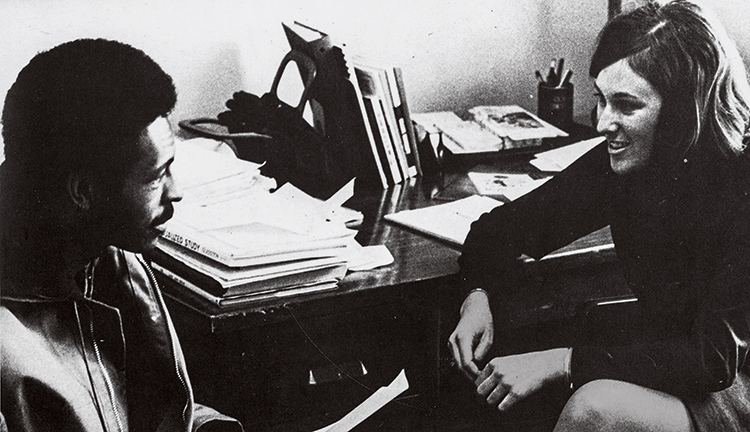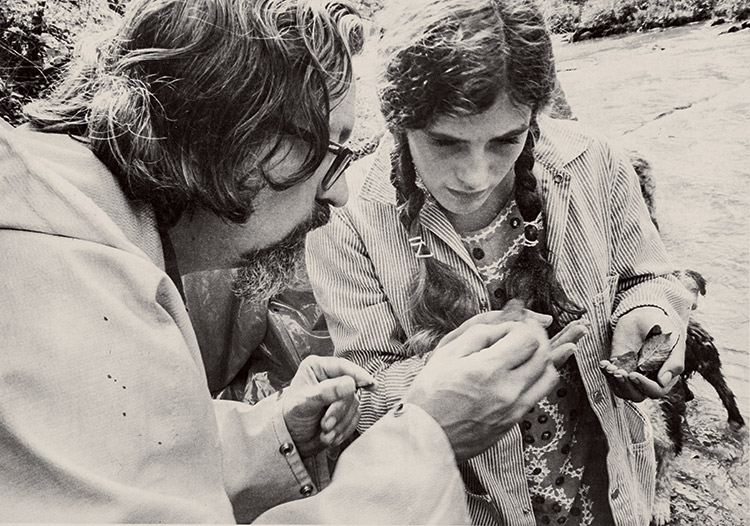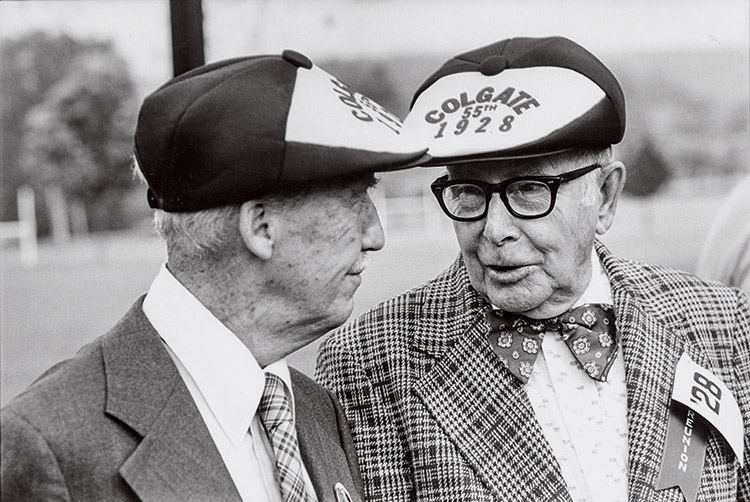
Coeducation Observations
I just read your wonderfully written article about the first class of women at Colgate. However, I feel that you left out one important perspective — the thoughts and viewpoints of the men who were at Colgate at the time.
Speaking for myself, if Colgate had not changed its policy, and if women had not begun entering Colgate in the fall of 1970, my years at Colgate would have been far less rewarding. The women who attended Colgate brought a richness — intellectually and socially — that was completely missing before their arrival. (By the way, if you asked me, I can’t even recall why I even thought that I would enjoy an all-male college.)
I was lucky to live in coed 84 Broad during my junior year and to be an RA in a coed freshman dorm my senior year.
I knew several of the women whom you interviewed for your story. As they displayed, they and their fellow female graduates were bold, brash, and dauntless. Colgate and its male students were extremely lucky that the women opted to be such pioneers.
P.S. In addition to praising President Bartlett and Dean Martin for their leadership during these initial years, I would also point out the contributions of the late Dean of Freshmen Karen Blank (pictured above). Hiring a woman to be dean of freshmen and hiring Karen to fill that position certainly facilitated the implementation of coeducation at Colgate.
Roy Lott ’73
I laughed when I read Gay Clark Jennings’ comment in “First Class” regarding the University “not thinking things through” in regard to welcoming the first class of women. I lived on the second floor of Center Stillman with 15 other freshman women. Our floor bathroom had one stalled toilet and two urinals, which we used as planters. During Thanksgiving break, the urinals were removed and replaced with a toilet without any separation. At some point, a shower curtain was installed around the new toilet to give the illusion of a stall. At least when someone was brushing her teeth at one of the two sinks she wasn’t able to sit in your lap.
Laurie Nelson ’74 Pocius
I remember attending the panel discussion when Colgate celebrated 20 years of coeducation, and I saved my commemorative T-shirt. I’m thankful for those first classes of women who paved the way for later generations. One of the reasons I decided to go to Colgate was that there was a woman editor of the Colgate Maroon at the time when I looked at the school.
Sabrina Lanz ’91
Just like with African Americans, Latinos, Asians, and Native Americans, women (of all colors) just needed the opportunity and no one standing in the way, then they would fly to the stars.
David Fort ’94
I was the third class to come through. It was really, really hard. But what groundbreaking change.
Linda Buchanan ’77 Allen
Props to the Pioneers
Regarding “And Away They Soared”: When I arrived at Colgate in 1990, it was the 20th anniversary of women being admitted. Throughout my four years, I heard many references to these graduates and how accomplished they were — and how fierce they must have been! They set a high bar and are still doing so. I am grateful.
Tobi L. Hay ’94
Thirteen amazing Colgate women! Especially loved seeing the recognition for my spectacular Colgate roommate, Nancy Norris ’77 O’Dowd!
Elizabeth Buchbinder ’77
An Important Addition
I was in the second class of women admitted and would like to add another milestone to the women’s timeline (“This Is What Progress Looks Like,”): the founding of the Swinging ’Gates, Colgate’s women’s a cappella group, in 1974.
Joann Calderone ’75 Galley
Defending Black Lives Matter
Response to the letter from Jonathan Sherwyn ’78, “On BLM for MLK Commemoration”: As a member of the Presidents’ Club, the Annual Fund, and the Alumni Admission Program, you have an important responsibility in creating a safe and welcoming environment for the entire Colgate community. You’re expected to have a deep commitment to Colgate’s values. Your recent letter about Opal Tometi does not demonstrate this.
Opal Tometi was named one of Time magazine’s 100 Most Influential People in 2020. She cofounded Black Lives Matter (BLM) in 2013 and mobilized the community to protest against police brutality. On the other hand, the Colgate Republicans invited Milos Yiannopoulos, a highly controversial figure, to speak in 2016. (His appearance at Berkeley cost the university hundreds of thousands of dollars after massive protests.)
Now, although BLM was founded in response to the acquittal of George Zimmerman, it is also an evolution of the civil rights movement. BLM is anti-violence, not anti-cop nor anti-capitalist. In 2020, protests held across the globe were “remarkably nonviolent,” according to research by the Washington Post. “When there was violence,” the Post reports, “very often police or counter-protesters were reportedly directing it at the protesters.” Russell Berman, a senior fellow at the Hoover Institution, said that BLM’s “emphatic support for gender identity politics sets it apart from historical Marxism,” and that the movement’s goals “do not appear to be expressly anti-capitalist.”
It’s very weird that one would condemn BLM while ignoring the conditions they protest against — conditions that have created people like John Lee Cowell, James Alex Fields Jr., Dylan Roof, Kyle Rittenhouse, Donald Trump, or the cops who’ve killed numerous innocent Black people. Do you suggest that we accept these conditions quietly? Or, what if we knelt in silence on a sports field? This isn’t about common decency; it’s about Black people wanting to not be murdered for being Black. The phrase Black Lives Matter exists so that everyone can thrive. Frankly, this is a movement led by powerful Black women to save our democracy.
Colgate students of color have experienced microaggressions, discrimination, and violence for a long time. You probably weren’t aware of this, so I recommend three items: 1. Ask students why it was important to host Opal Tometi; 2. Connect with alumni of color and get their valuable insight; 3. Share what you’ve learned with us.
Black Lives Matter will continue to be gravely important until people decide to open their hearts to loving Black people as the Americans, and fellow Colgate members, that they are. There’s still a lot of work to be done. (For the record, Angela Davis is an American national treasure.)
Pablo Gonzalez ’01
I take notable exception to my classmate Jonathan Sherwyn’s criticism of the decision to have Black Lives Matter cofounder Opal Tometi as a keynote speaker at the Colgate University Commemoration of Martin Luther King Jr.
His characterization of BLM as a Marxist group that espouses hateful rhetoric is grossly unfair and simplistic. Systemic racism and injustice in our country are unfortunately still very much a part of our society. Ask the families of Rayshard Brooks, Daniel Prude, George Floyd, Breonna Taylor, and Atatiana Jefferson.
Thank you, Colgate, for having the courage to acknowledge that reality.
Craig Padover ’78
BLM is a network of loosely affiliated networks. Jonathan Sherwyn is painting the movement with the bad actions of a few. (From the BLM signs in my neck of the woods, it looks to be a thoroughly capitalist initiative.) And he has been misled into characterizing it as a Marxist effort. Kudos to Colgate for bringing Opal Tometi to campus. I hope she delivered an engaging talk.
Kathryn Roy ’79
I was dismayed and frankly really disappointed to read the letter by Jonathan H. Sherwyn ’78. Mr. Sherwyn claimed that the Black Lives Matter organization is one that embraces violence, that has a “left-wing” agenda, and that supports “convicted terrorists.” He used clearly red-baiting language in calling the organization Marxist.
What Mr. Sherwyn decided to obfuscate is that the Black Lives Matter (BLM) movement is an open movement with a host of organizations participating. Marches and protests are definitively not “terrorist” activities. Mr. Sherwyn also declined to mention that BLM and allies are fighting the very real and daily violence of policing heaped upon Black people and communities (for centuries at this point). He declined to mention that Black people and allies, through grassroots movements that include a diversity of strategies and tactics, are trying to remove the stranglehold of systemic and institutional racism that is part of the very fabric of this country. Mr. Sherwyn seems to think that BLM and these aims are somehow at odds or are, as he put it, “the antithesis” of everything that Martin Luther King stood for. He calls Angela Davis and Assata Shakur “terrorists.” Davis is a noted intellectual and has devoted her life to the liberation of Black people. Shakur risked her life and is now in exile in the service of the liberation of Black people. In fact, Colgate was the first place where I learned about Davis and Shakur when I worked as a student aid in the women’s studies center.
I understand that letters are opinions. However, some opinions are dangerous and shouldn’t be given credence by giving them a wider audience.
Jay Donahue ’00
Fighting Stigma
I work at POZ Magazine, [which is] for people who are affected by/have HIV/AIDS. I appreciate [Professor Abdul-Malak’s] view (“Racialized Stigma Fueled by a Crisis,”), as an Asian American living in a time of anti-Asian rhetoric. I know that those who still fight against the AIDS stigma see the parallel to this recent virus, as well as the differences. Thank you, Professor Abdul-Malak, for teaching students to see 360. There are many views on a
topic, which is the basis of the Colgate education.
Doriot Kim ’92
Remembering Judy Fischer
On Oct. 29, 2020, Judy Fischer, a Colgate treasure, passed away. If you knew her, you were blessed. As her Facebook page revealingly proclaims: “Loved my job for 34 years. I never had a day that I did not want to go and work with students.”
When Judy arrived at Colgate in the early 1970s with her two children, no one could have imagined the transformational impact she would have on the lives of Colgate students for nearly four decades.
As associate director of career services, she provided guidance, support, and friendship to generations of students. Committed to serving everyone, she gave early and active support to LGBT and minority students and provided an oasis of acceptance and comfort that may not have been easy to find in the mainstream Colgate community. Students could often be found around her kitchen table sharing dinner with her family. Many of them would continue to join Judy in her home for decades after graduation.
While she helped launch countless careers, consider one story: Spring. Friday afternoon. A hapless senior in desperate need of a job is urgently summoned to career services. Judy has convinced a Roadway Express representative to stay late to interview the student: “You’ll love the recruiter, and it is the highest paying job available through campus recruiting” (note that the hapless job seeker is also comprehensively broke). Unpersuaded by the student’s complaints that this unexpected interview will cut into happy hour, Judy insists. Miraculously, the student interviews and gets an offer before racing to the Jug, feet barely touching the ground. Two years later, Judy hears that the slightly-less-hapless and somewhat-less-broke recent graduate is considering a job change. She reaches out and connects him to a Colgate alum who has an opportunity in Washington, D.C. A job with Prudential quickly materializes. This leads to a career, and — it must be said for the health and safety of the former student — a 30-year marriage to a coworker. Thirty-five years later, our still fairly hapless but substantially-less-broke protagonist is forever grateful that, as he imagines, when someone said to Judy, “Bet you $5 you can’t get THAT kid a job,” she replied, “You’re on.” Thus, lives were changed and lifelong friendships built. That was Judy Fischer.
The Colgate community can take comfort that she is in the arms of a loving God … one can only wonder whether she is giving him career counseling.
Chris Gavigan ’84
Opening Doors
On the University joining Questbridge: So proud of the explicit efforts to broaden the affordability of the excellent education and opportunities a Colgate education provides, even in the midst of a pandemic and economic turmoil.
Robert Whiteman ’74
Photo ID

1. Thanks for the article (“First Class”). Bob Reid ’76 called to tell me my photo was in the autumn issue of Colgate Magazine, and sure enough, there I am — the one with the pigtails — standing close to Professor Bob Lindsey (geology) holding some leaves.
Sally Waldo ’76 Reid

2. “We’ll Be Together Again” (summer 2020): My dad (Hudson Phillips ’28), on right. He was a “jumping” chaplain in the 11th Airborne division in World War II and participated in the liberation of the Philippines.
Hudson Phillips Jr. ’56
